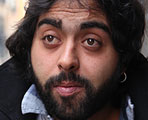Interview: Pablo San Nicasio
Photos: Rafael Manjavacas
«The only thing that lasts is flamenco»
|
The discerning eye of Paco de Lucía discovered him three years ago, and since then his name has circulated so much that his brother, his “alma mater“ as he himself calls him, encouraged him to make a first recording that’s now in the works. In a few months “Jacobeo”, the recording debut of David Maldonado Santiago, “David de Jacoba” (Motril, Granada, 1985), will be released. For the moment, and with the invaluable help of the Amor de Dios flamenco school, in December he’ll be with his brother Carlos, Lucky Losada and Isaac de los Reyes, also present at Madrid’s “Caracol”. Just to get things underway. How’d it go in Turkey with the maestro (Paco de Lucía)? It looks like flamenco is in your family. Who was Jacoba? Is there a flamenco ambience in Motril and Granada? I suppose it was through Josele that you came to be with Paco de Lucía. And the idea of making a recording? Isaac de los Reyes: You’re going to see how this record makes a big splash. Just look at me, I have my flamenco hopes and dreams, I don’t mean about singing or making a record, just about flamenco as an absolute as it occurs in David. This is a guy who is very expressive, all heart, a love of looking back and listening to the historic singers…he’s going to surprise you all. I saw it a lot in my much-admired Enrique Morente with whom I was lucky enough to spend some time. I wish he could be here right now, he appreciated this thing of where we flamencos come from. In my generation there’s a lot of talent, but you have to always be looking back, I never get tired of repeating that.
At the Caracol you’re not going to sing everything, are you? “It’s important to remember and be grateful to Amor de Dios for everything they’re doing for me, and this recital is partly thanks to them” “The maestros I’ve been with said so… I feel supported by them in the idea of doing traditional, pure, orthodox flamenco”. When do you expect the record to be out? Taranta? He wasn’t doing it lately, that’s great. What else is there on the record? So it doesn’t seem to be a record of pop songs. Paco for example is adamant about this. He wants me to do flamenco, because that’s what lasts. He talks about El Chozas, Pepe Palanca, Tío Borrico, Carbonerillo… He talks about people who went to his house with his father and he played for them when he was a boy. But of course, they’re such odd names, and I ask “who’s that?”, and there’s no way you find these things in stores on on-line. And he says “don’t worry, I’ll try find something at home for you”. My brother also guides me like this. The record is being produced by my brother Carlos de Jacoba, Lucky Losada and myself. I’m calling it “Jubileo”, which represents the years of peace scrupulously respected in the Holy Land. I like that idea.
|
